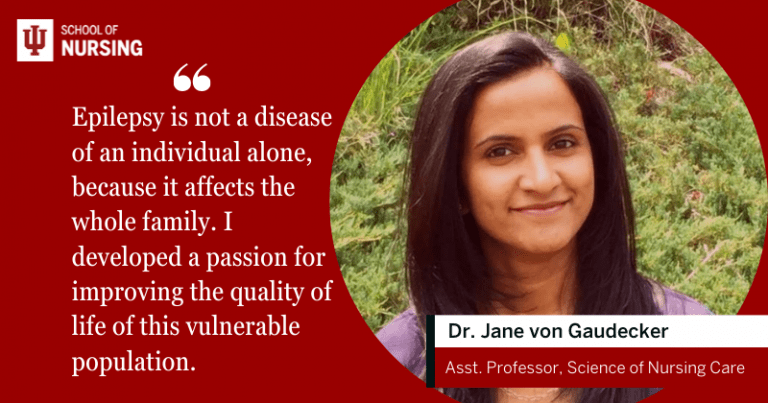Indiana University School of Nursing faculty are creating lasting partnerships that are having a tremendous impact on health care across the globe. One of these faculty members is Jane von Gaudecker, MSN, PhD, FAES, who, since completing her postdoctoral work at IU School of Nursing, holds the distinction of being the only epilepsy nurse scientist in the United States to work globally to improve access to care for people with epilepsy.
Dr. von Gaudecker is currently conducting research in partnership with a well-established consortium of North American universities, led by Indiana University and Moi University in Kenya, known as AMPATH, which is short for the Academic Model Providing Access to Healthcare. In collaboration with a team of researchers, clinicians and community groups, Dr. von Gaudecker is seeking to improve treatment and outcomes for people with epilepsy.
"Our previous study from Moi Teaching and Referral Hospital in western Kenya found that only 28% of newly diagnosed individuals with epilepsy returned for follow-up," says Dr. von Gaudecker. "This is a high-risk population because premature death is greatly increased for newly diagnosed people with epilepsy who do not receive anti-seizure medication."
The team’s current ethnographic study will explore why some of these newly diagnosed people with epilepsy return for treatment follow-up and others do not.
Epilepsy is a neurological condition that affects the nervous system and is also known as a seizure disorder. According to the Global Burden of Disease Study, epilepsy prevalence is highest in sub-Saharan Africa. In western Kenya, most people with epilepsy remain untreated, though 70% could remain seizure-free with appropriate and low-cost anti-seizure medication.
Dr. von Gaudecker's work to gain knowledge about epilepsy and those affected by the disease earned her the Victor Rabinowitch Memorial Award for Young Leaders in International Scientific Cooperation from CRDF Global, an independent nonprofit organization dedicated to bolstering the global scientific community. "Dr. von Gaudecker exemplifies Victor Rabinowitch's dedication to promoting international science collaboration with Africa to enhance the quality of life for all people," writes the award sponsors.
"Having been born and brought up in a low- and middle-income country, I have personal experiences that have led to a long-standing dedication to make a difference among underserved and vulnerable populations living with this stigmatized disease," says Dr. von Gaudecker, who is a native of India.
Dr. von Gaudecker says she was first introduced to the clinical experience of working with people with epilepsy while serving as the epilepsy unit coordinator at the F.E. Driefuss Epilepsy Center at the University of Virginia Medical Center in Charlottesville.
"During that time, I found that epilepsy is not a disease of an individual, alone, because it affects the whole family," says Dr. von Gaudecker. "I developed a passion for improving the quality of life of this vulnerable population."
While Dr. von Gaudecker and her team are making strides in improving treatment and care outcomes for people with epilepsy, they won't rest until they can ensure those who are struggling with seizures can enjoy good health.
"My hope for people with epilepsy in western Kenya is that they can lead normal and productive lives and do not have to worry about their seizures."
For more information about Dr. von Gaudecker’s work and how you might provide support, contact Michelle Soucy, director of development at IU School of Nursing, at msoucy@iu.edu.


